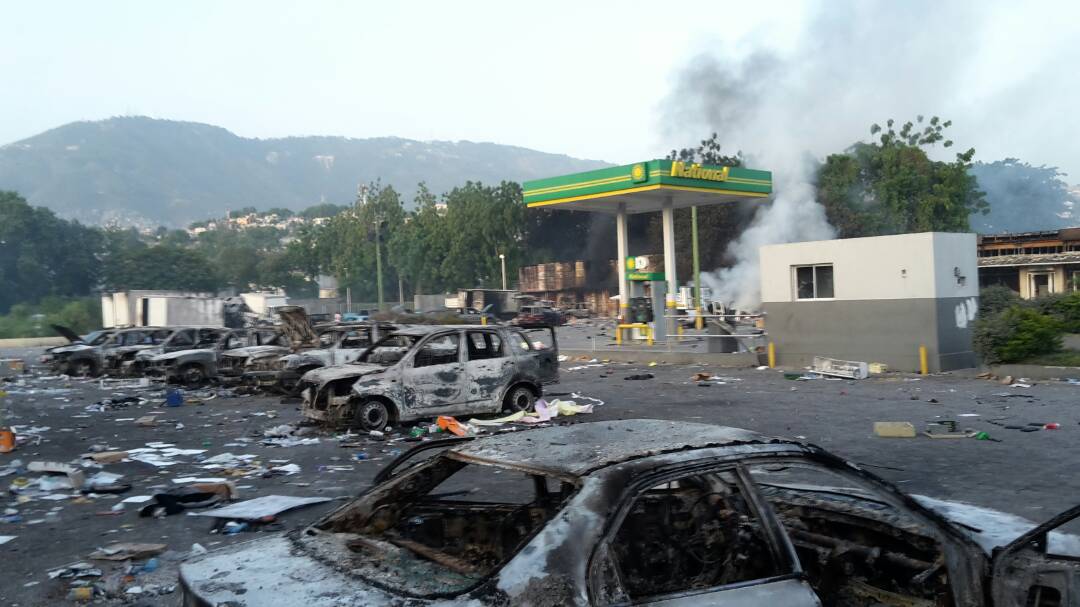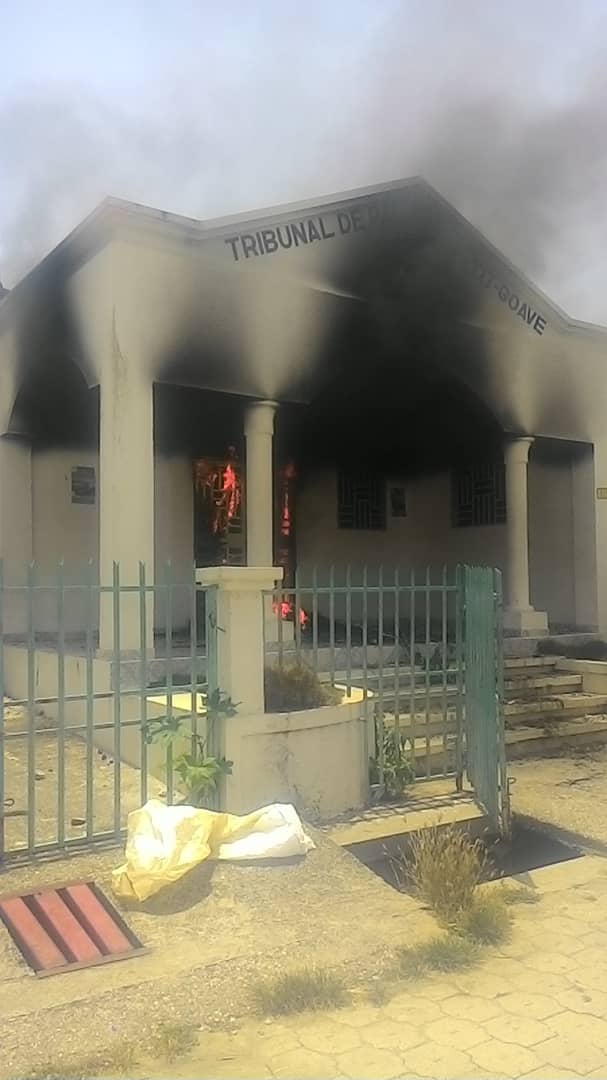Nationwide Popular Uprising Calls for President Jovenel Moïse’s Removal
by Kim Ives - Haiti Liberte
July 11, 2018
Haiti exploded this past week in a nationwide uprising whose Kreyòl watchwords are “nou bouke,” meaning “we are fed up.”
Like a volcano, the explosion of anger and violence was building over the past 17 months of President Jovenel Moïse’s rule, which has been characterized by corruption, waste, double-talk, repression, and subservience to neoliberal dictates.
The spark was the slashing of fuel price subsidies mandated by the International Monetary Fund (IMF) in return for $96 million in “budget support.”
As a result, a gallon of gasoline rose 38% from 224 to 309 gourdes ($3.45 to $4.75), diesel leapt 47% from 179 to 264 gourdes ($1.74 to $4.06), and kerosene soared from 173 to 262 gourdes per gallon ($2.66 to $4.03). In comparison, the average cost in the U.S. of a gallon of gas is $2.86, of diesel is $3.25, and of kerosene is $3.60.
Demonstrators surged into the streets of cities
and towns around Haiti, erecting barricades, on Jul. 6
when the Haitian government announced huge fuel price increases.
Back on Mar. 8, Economy and Finance Minister Jude Alix Patrick Salomon announced that the Haitian government had bowed to the IMF’s demands in February, saying the fuel price hikes would take effect in July. Public transport drivers’ unions and popular organizations protested, pointing to the deepening poverty of Haiti’s masses and their inability to pay public transport costs.
A National gas station and cars were burned as demonstrators targeted
businesses owned by members of Haiti’s bourgeoisie, particularly the Boulos family.
“The country will be blocked if the state stubbornly insists on raising prices for petroleum products,” said Edva Dorismé, vice president of the Haiti’s Assembly of Tap-Tap Drivers (RCTH).
But Culture and Communication Minister Guyler C. Delva insisted the hikes would go forward, saying it was for the people’s own good.
“It is criminal on the part of the Haitian State to take such a measure, while there are other ways to find money without harming people,” said Jonel Merisier, the president of the Union of Drivers and Vehicle Owners of Mirebalais (SCPVM).
Many Haitians are avid fans of the Brazilian national soccer team, and the government apparently had hoped that they would be distracted by the Jul. 6 Brazil vs. Belgium contest during the ongoing World Cup. Just after the match began, it published the decree with the new increased prices to take effect the next day.
Government strategists apparently thought that Brazil would win the match and that the ensuing celebrations in Haiti would drown out any outrage over the price hikes.
Unfortunately for them, Brazil lost to Belgium and was eliminated from the World Cup competition. The Haitian masses’ resulting anger and disappointment over the loss dovetailed with the shock of finally seeing the new higher fuel prices, creating a perfect storm.
It was the last straw. Months of frustration boiled over. Faced with a 13% inflation rate and (officially) 14% unemployment, Haitian workers have been demonstrating for the minimum wage to be raised from 335 to 1000 gourdes a day ($5.15 to $15.39).
The government has spent millions on a pointless traveling carnival of political hoopla and promises called the “Caravan for Change,” generating resentment among Haitians with dwindling, poverty-stricken schools and hospitals. Local and municipal governments are also cash-starved while Jovenel’s regime spent millions more on resurrecting the traditionally-repressive Haitian Army last November.
The government has effectively blocked any investigation into where some $3.8 billion disappeared from the PetroCaribe fund, drawn from revenues from the sale of cheap Venezuelan petroleum products. An unpopular budget drawn up last year taxes the poor and even expatriate Haitians; the government has wasted time and money on a still-born “national dialogue” initiative called the General States (États Généraux) and recently distributed 3,000 large flat-screen TV sets to all senators and deputies for a rumored cost of $14 million so that rural Haitians could supposedly watch the World Cup.
All the while, police forces have used brutal and sometimes lethal force against demonstrators, jails are severely overcrowded with mostly untried detainees, and kidnappings, robberies, and “insécurité” (lawless atmosphere) are on the rise.
From Jul. 6 to 10, angry demonstrators took to the streets, setting up barricades of burning tires, car chassis, and furniture. The ravine-lined road through Canapé-Vert was coated with slick oil, making it too dangerous to drive on. Other areas around the capital of Port-au-Prince like Delmas, Lalue, Nazon, Champs-de-mars, Carrefour-Feuilles, Carrefour Fleuriot, and Kenscoff were inaccessible. Demonstrators also filled the streets of several other cities such as Cap-Haitien, Petit-Goâve, Les Cayes, Jérémie, and Jacmel, as well as towns in the Artibonite.
In the upscale neighborhoods of Pétionville, car windshields and house windows were broken. Banks, warehouses, gas stations, hotels, car dealerships, and supermarkets belonging to the bourgeoisie (particularly the Boulos family) were targeted for destruction, burning, and looting.
The court house in the town of Petit-Goâve was burned and the General Directorate of Taxes (DGI) was almost burned, with the building’s walls blackened by flames.
The government, through televised speeches, tweets, and press releases from the president, prime minister, and police brass tried to calm the protesters with hollow, meaningless declarations calling for calm.
Demonstrators burned the courthouse in Petit Goâve.
Credit: Haitian Information Project
“I’m asking you for patience because the administration’s vision is clear,” said PM Jack Guy Lafontant in a completely ineffective televised speech on the morning of Jul. 7.
“It has a clear program that it continues to execute.”
Protests grew. By that afternoon, President Moïse had to make his televised speech, where he announced that the price hikes would be withdrawn. But it was too little, too late.
“There is no other alternative. He has to go,” professor Auguste “Gougousse” D’Meza, an educational and political consultant in Port-au-Prince, told the Miami Herald.
“The people don’t believe in him anymore.”
Already, many Haitian parliamentarians are calling for a no-confidence vote on Lafontant’s government, which may be sacrificed in an attempt to save Jovenel’s regime. Many representatives from Haiti’s bourgeoisie are also calling on Lafontant and his ministers to step down.
However, the target of the masses’ fury is not the prime minister but the president who selects him. “In his mind, he thinks he has done something serious,” Sen. Patrice Dumont said of President Moïse to the Miami Herald. “Up until now, he’s not living in reality.”
The “Core Group,” dominated by ambassadors from the U.S., Canada, and European nations, urged Haitians on Jul. 10 to “respect constitutional order,” in other words to not force Moïse’s resignation and flight. They also called on “national authorities to engage in deep and inclusive dialogue with all the other key actors of the country so as to restore calm, promote social cohesion, and assure the security of people and property.”
The U.S. embassy, like most of the others, has been closed through most of the tempest, urging U.S. citizens to “shelter in place.”
Hundreds of Haitian expatriate summer vacationers and U.S. missionaries were stranded at international airports in Port-au-Prince and Cap Haïtien when airlines like Spirit, JetBlue, and American cancelled flights on Sat., Jul. 7. Flights gradually resumed over the following three days.
Many police officers abandoned their posts or did not venture out in the face of the masses’ wrath. One police officer, Robert Scutt, was killed when he tried to break through a street barricade.
There were at least four deaths which resulted from the uprising and its repression.
A general strike on Mon., Jul. 9 and Tue., Jul. 10 was successful nationwide, although people began to resume their activities late Tuesday.
While the virulence of the popular demonstrations has clearly shaken Haiti’s rulers, the leaders of Haiti’s popular and democratic opposition sector are currently divided and weak. Without organizational infrastructure and a clear strategy and line of march, the uprising will likely subside in coming days… at least temporarily.
But the speed and strength with which the demonstrations of the last five days developed make clear the fragility and volatility of Haiti’s political situation and augur more popular revolts in the days and weeks ahead.



No comments:
Post a Comment